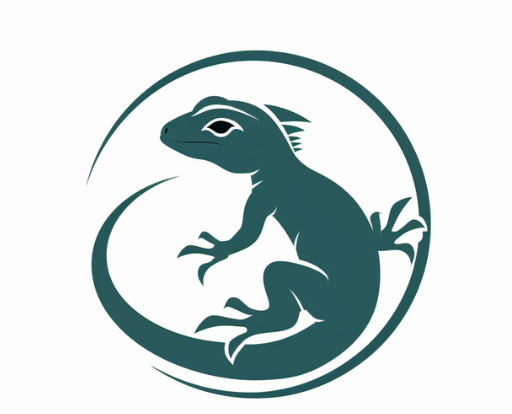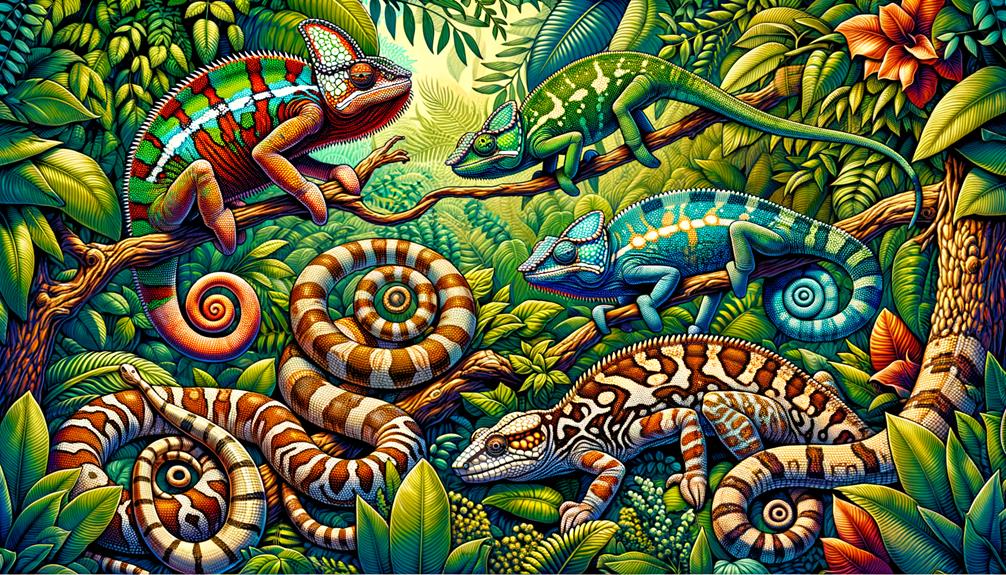I'm fascinated by the impressive cognitive skills displayed by reptiles, such as Puerto Rican Anolis lizards. These lizards demonstrate remarkable flexibility when it comes to problem-solving, adapting their behavior when rewards are moved. This ability challenges traditional views on reptilian intelligence, revealing cognitive capabilities that rival those of some birds and mammals. What sets Anolis apart from other reptiles is their unique cognitive adaptations. This insight into reptilian learning abilities not only redefines our understanding but also has broader implications for evolution. Uncovering the intricacies of their cognition could reveal fascinating details about the boundaries these creatures push in terms of intelligence.
Key Takeaways
Anolis lizards have demonstrated impressive cognitive flexibility by solving tasks and adapting to changes in rewards, much like birds and mammals.
Reptiles, such as caimans, exhibit learning patterns that are more similar to those of turtles and rats than to advanced avian cognition.
Reptiles showcase remarkable behavioral adaptability through specialized sensory mechanisms and spatial learning abilities.
Automated systems, like ReptiLearn, enable researchers to study reptile behavior and cognitive abilities in great detail.
The advanced problem-solving abilities of Anolis lizards suggest that intelligence has evolved convergently across different reptilian lineages.
Cognitive Flexibility in Reptiles
The remarkable cognitive flexibility displayed by Puerto Rican Anolis lizards challenges our traditional views on reptilian intelligence, revealing capabilities that are both nuanced and sophisticated. These lizards exhibit unique features that set them apart from the stereotypical image of reptiles. Typically, reptiles are thought to follow rigid, instinctual behavior patterns. However, the Anolis lizards defy this notion.
In a study conducted at Duke University, four out of six Anolis lizards consistently solved a task by biting or shoving aside a blue disc to obtain a reward. This indicates a level of learning and adaptability that's quite impressive. When the reward was placed under a different colored disc, the lizards adjusted their behavior, further demonstrating their cognitive flexibility. Two of the lizards even reversed their choice, showing they could associate specific colors with rewards.
This behavioral adaptability suggests that Anolis lizards possess cognitive abilities similar to those of birds and mammals. Their success across the tropical Americas may be attributed to this cognitive flexibility, prompting us to reassess our assumptions about reptilian cognition and behavior. It's clear that these creatures have more complex thought processes than we've given them credit for.
Problem-Solving Skills
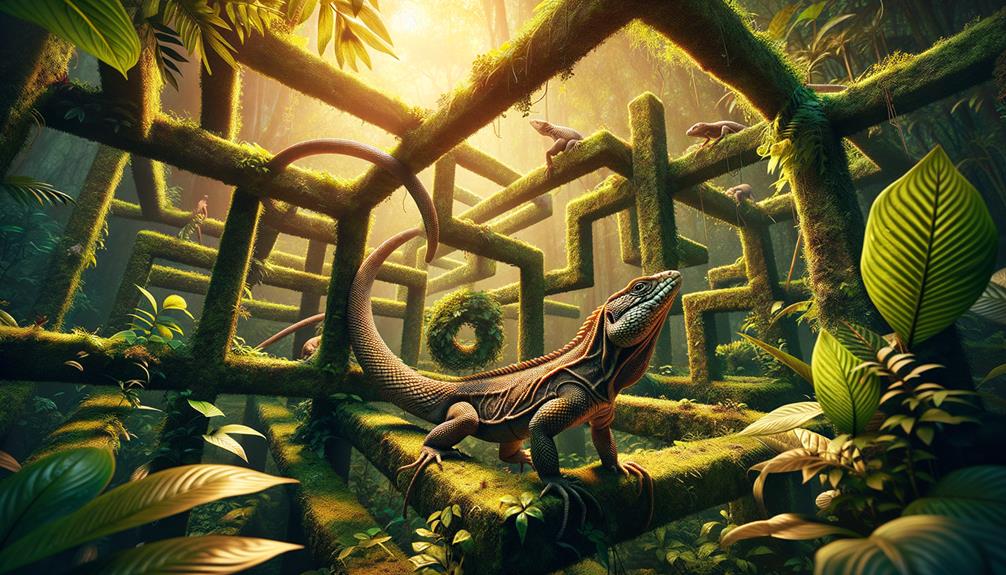
Examining the problem-solving skills of Puerto Rican Anolis lizards reveals their surprising ability to adapt and learn from changing conditions. These lizards, including the green anole, have shown they can tackle challenges that were previously thought to be beyond reptilian capabilities.
In a study where Anolis evermanni had to identify a reward under a blue disc, four out of six succeeded, even reversing their choice when the reward was placed under a different colored disc. This behavior challenges the outdated notion that reptiles exhibit only rigid, stereotyped behaviors.
The flexibility observed here is remarkable and suggests that these lizards possess a higher level of cognitive skill. This adaptability might be a key factor in their successful spread across the Americas. The green anole, for example, could benefit from such problem-solving skills in its diverse habitats.
Here's a closer look at their abilities:
| Problem-Solving Task | Success Rate | Flexibility Demonstrated |
|---|---|---|
| Blue disc challenge | 4 out of 6 | High |
| Reversal learning | Successful | Yes |
| Adaptation to change | Observed | Significant |
| Cognitive skills | Advanced | Surprising |
These findings open the door for further research into reptilian cognition, challenging our understanding and inviting us to reconsider the mental capabilities of these fascinating creatures.
Comparative Studies
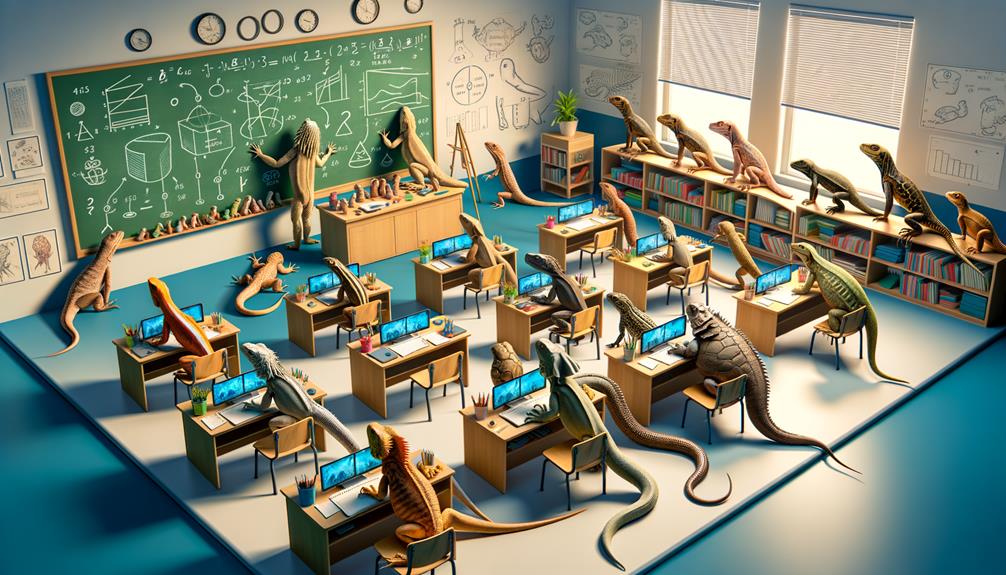
When we compare reptilian cognition to that of other species, it's striking to see how their learning abilities align more closely with turtles and rats than with birds. For example, caimans exhibit learning patterns that are remarkably similar to those of turtles and rats, rather than the more advanced cognitive skills seen in birds. This insight into their natural history encourages us to reevaluate how we perceive reptilian intelligence.
Understanding these comparative studies is vital because it highlights the evolutionary path of reptilian cognition. By examining the learning capacities of reptiles, we can identify parallels and distinctions that shed light on broader behavioral principles. This approach allows us to appreciate the unique cognitive niches that reptiles occupy, separate from the avian lineage.
As we expand our knowledge of reptilian cognition, we need to consider the implications for their welfare, particularly in captivity. Recognizing that reptiles have specific cognitive needs can inform how we care for them, ensuring their environments are stimulating and supportive. Advances in this field not only deepen our understanding of reptile behavior but also contribute to the welfare of both captive and wild reptiles, underscoring the significance of this research in the broader context of natural history.
Behavioral Adaptations

Reptiles have developed remarkable behavioral adaptations that showcase their ability to learn and survive in diverse environments. Their specialized sensory mechanisms, such as infrared-sensing pits, allow them to detect minute temperature variations, which is crucial for finding prey or recognizing safe habitats. This natural sensory advantage facilitates their learning and conditioning processes, enabling them to adapt to a range of ecological niches.
Through self-directed exploration, reptiles use flexible spatial learning abilities to associate unmarked locations with food rewards. Unlike mammals, they often learn without human intervention, demonstrating their innate problem-solving skills. However, our understanding of these capabilities has been limited due to the lack of suitable behavioral and neurophysiological tools for studying ectothermic animals.
The ReptiLearn system has revolutionized our approach to studying reptile cognition by providing an automated platform for long-term experiments in their natural environments. This system allows researchers to observe and analyze the natural behaviors and interactions of various reptile species without invasive methods.
| Feature | Reptile Adaptation Example |
|---|---|
| Sensory Mechanisms | Infrared-sensing pits |
| Spatial Learning | Associating locations with food |
| Research Limitations | Inadequate tools for ectotherms |
| ReptiLearn System | Automated, non-invasive studies |
| Classroom Suitability | Engaging and educational |
These behavioral adaptations highlight the intricate ways reptile species have evolved to thrive in their habitats.
Implications for Evolution
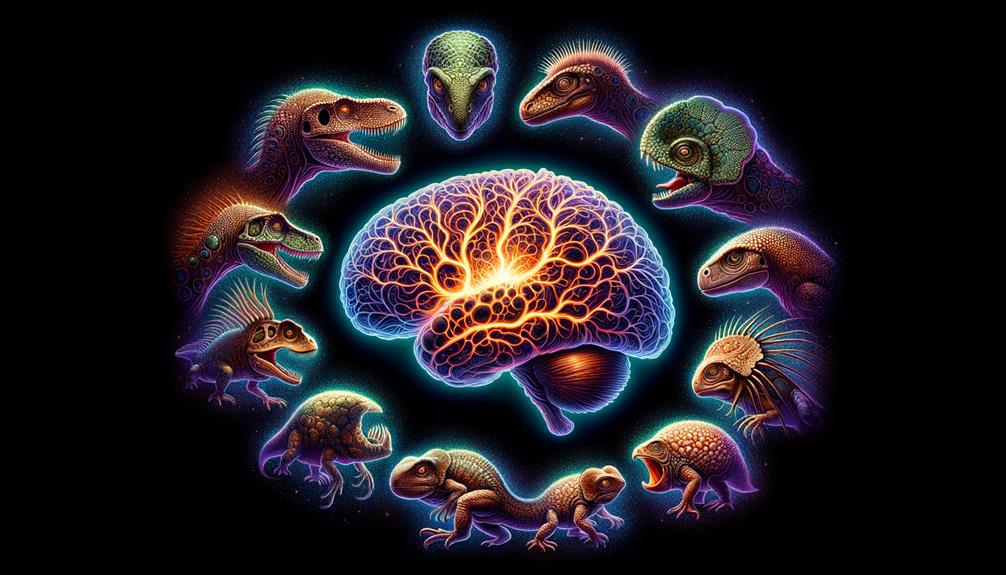
The discovery of flexible problem-solving skills in Anolis lizards challenges our previous assumptions about reptilian intelligence, suggesting a more complex evolutionary history. These findings imply that certain lizard species possess cognitive abilities far more sophisticated than we once thought, which could explain their successful radiation and diversification across the Americas.
By adapting to various ecological niches, Anolis lizards may have developed advanced learning capacities, enhancing their survival and reproductive success. This adaptability hints at underlying neural and behavioral mechanisms worth exploring, which could help us understand the environmental pressures driving this diversification.
Comparing reptilian lineages could reveal how intelligence evolved under different conditions. This might also highlight the convergent evolution of problem-solving skills in other vertebrates, showing common principles underlying intelligence across diverse species.
In essence, the cognitive capabilities of reptiles like Anolis lizards force us to reassess the evolutionary boundaries of intelligence. By examining these aspects, we may uncover broader evolutionary patterns and understand the intricate relationships between environment, behavior, and cognitive evolution.
Frequently Asked Questions
Are Reptiles Capable of Learning?
Reptiles are capable of learning, and research has shown that they can exhibit problem-solving skills and cognitive flexibility. For example, studies have found that caimans and Anolis lizards can adapt to new situations and learn from experience. This challenges the traditional view of reptiles as having limited abilities and rigid behavior, and instead suggests that they are more intelligent and capable than previously thought.
What Are the Emotional Intelligence of Reptiles?
I find that reptiles display limited emotional intelligence compared to mammals. They don't form complex social relationships or show empathy. Their behaviors are mainly driven by instinct and survival needs, rather than emotional connection or social interaction.
What Special Abilities Do Lizards Have?
Lizards, such as the Anolis evermanni, have impressive cognitive abilities. They can learn to associate colors with rewards and adapt their behavior when circumstances change, which challenges our understanding of reptilian intelligence.
Do Reptiles Benefit From Cognitive Enrichment?
Reptiles do benefit from cognitive enrichment. I've observed that they become more active, display fewer repetitive behaviors, and adapt better to changes when provided with complex environments and problem-solving tasks. This clearly enhances their cognitive development and overall well-being.
